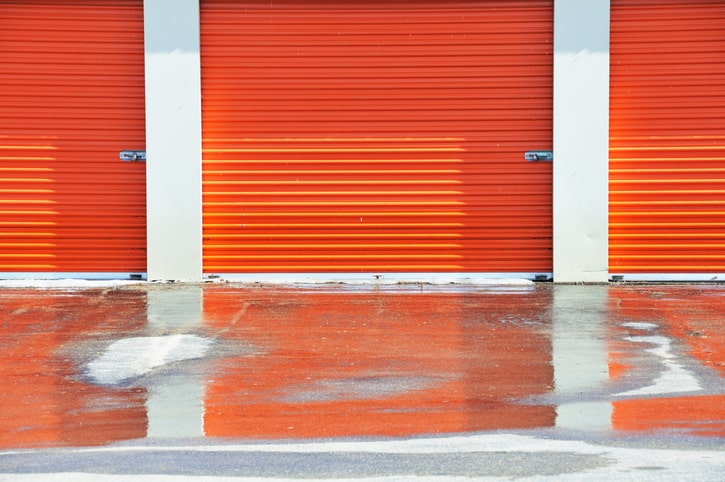Why is Climate Control Beneficial in the Winter?

When you think of climate control, you likely think of it in reference to hot and humid climates. However, if you live in a climate that experiences a lot of snow or both heat and cold, you still stand to benefit from a climate controlled storage unit. After all, the cold can affect your items in storage just as much as heat can. Find out how you can benefit from climate controlled storage—even in the winter.
What is Climate Control?
Climate control is similar to the heating and cooling system in your home that allows you to keep your home at a comfortable temperature. While you may not always have control over the conditions in your climate controlled unit, as many families control the heating and cooling in a climate controlled unit, you can count on your unit to maintain a stable temperature year round. If temperature-sensitive items are subjected to extreme temperatures for extended periods of time, you risk warping, cracking, bending, and other forms of weather damage. If the temperature rises above or drops below the set temperature in your unit, a high-tech ventilation system will kick in and reset it.
Why do I Need Climate Control?
Just like warm weather, cold weather can wreak havoc on your valuable items. It is ideal to keep your items at a constant temperature throughout the year. If you live somewhere like the Midwest or Northeast United States, you have both extremes that you need to protect your items from. If you still think you can do without climate control, here are just a few of the common items we recommend storing in a climate controlled unit, and the kind of damage they can sustain if left in less than ideal conditions for long periods of time:
Appliances
If you store refrigerators, microwaves, washers and dryers, or any other household appliance in your storage unit, they may be damaged more by the cold than the heat. Many household appliances have water lines and intricate mechanical systems that can be ruined if they are exposed to freezing temperatures.
Artwork and Instruments
Without a heated storage unit, artwork and instruments will not survive the winter months. Canvases can crack in addition to the paint or any other medium placed on your artwork. Conversely, the metal, wood, string, and inner parts of your instruments may snap or become damaged. You may go to play it and not be able to get it to make a sound or play in tune.
Batteries and Electronics
Battery-operated devices and electronics are more delicate than you might imagine. Any kind of battery you may store has liquid in it that can freeze and then cause cracking when it expands again in warmth, rendering the battery useless and dangerous. Most electronics have fragile operating systems, too, so the cold can cause them to malfunction or quit working altogether.
China, Glassware, and Dishes
All delicate materials such as glass and china will not do well in winter temperatures. Most items made of these materials will crack or shatter in freezing temperatures. If you hope to store your favorite china in a unit over the winter, you need to have climate-controlled storage to preserve them properly.
Clothing
Anything made of a delicate material like leather can be damaged beyond repair from freezing weather. Leather can crack and other materials can be damaged by the humidity that comes when the winter weather takes a turn for the warmer.
Collectibles and Heirlooms
Comics, magazines, antiques, stuffed animals, types of vinyl, coins, stamps, and other collectibles or heirlooms should be stored at a consistent temperature. If not, they will become too ruined to ever be worth their original value or too damaged to pass on to your family members.
Documents and Photos
Alt text: woman looking at photos while packing them into a box.
Heat and humidity can warp your photos and important documents, but cold can damage them just as much. The extreme jump in temperatures can cause fading or discoloration. If your storage unit temperature drops below freezing, your photos can even crack and be ruined forever.
Engines
Alt text: Vehicle in storage
If you store mowers, leaf blowers, cars, golf carts, motorized bikes, boats, or any vehicles or devices with engines in them, you may come back to them not being able to start. There could be cracks in important hoses and pipes that lead to your engine as well as damage to the electrical systems in these devices.
Furniture
Materials like metal, wood, and leather do not handle the cold well at all. Wood and leather will begin to crack and metal will stiffen up in freezing temperatures. If you have any pieces of furniture that are made of any of these delicate materials, you may take them out in the spring to realize the fabric isn’t strong enough to be used anymore.
Prevent Weather Damage with Climate Control from Copper
Even if you aren’t storing any of these items in your storage unit, a climate controlled unit holds many benefits for those who plan to use their storage unit long-term. Climate-controlled units are sealed more tightly to keep the temperature regulated better. Many climate controlled units are indoors, meaning you don’t have to worry about the outside elements creeping indoors.
Whether you live in a balmy paradise, a snowy wonderland, or experience a little bit of both, you can still witness weather damage on your stored items if you don’t pick climate-controlled storage. Find a climate-controlled storage unit at Copper Storage Management and keep your temperature sensitive items in mint condition for many years to come!